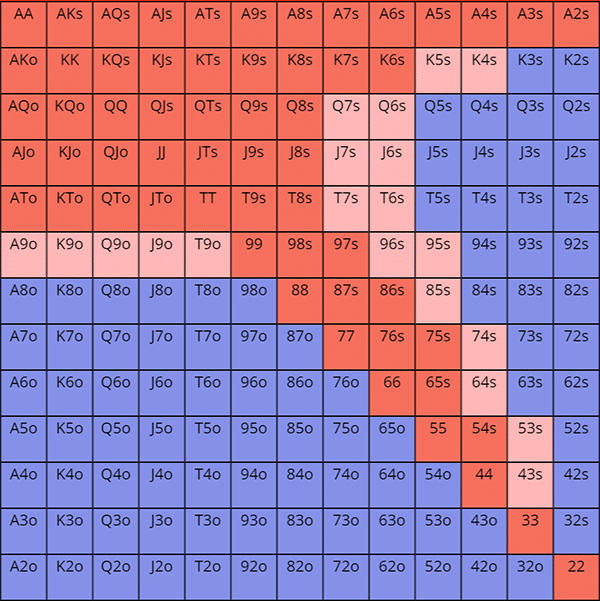

Getting down the basic fundamentals of pot odds and implied odds will help you make better decisions in terms of the price you’re getting to continue. And being cognizant of reverse implied odds situations so you can look to avoid them and the costly spots they can put you in will help save you a lot of chips in the long run.
In poker, pot odds are the ratio between the size of the pot, including bets made in the current round, and the cost of a call to try to win the pot. For example, if there are 10$ in the pot, and your opponent bets 5$, you need to pay 5$ to potentially win 15$. Therefore, your pot odds are 3 to 1. What the heck does 2:1 or 3.5:1 even mean!? These are examples of pot odds, which are the lifeblood of making good poker decisions when facing bets and raise. A poker odds calculator is a piece of poker software that lets you run any scenario that you might see at a poker table. You can fill in your own hand and calculate the chances of you winning. Put simply, pot odds means is there enough in the pot to call a bet. The fundamental principle of playing a drawing hand in poker is that you need a pot big enough to call. When we have a flush draw or a straight draw we will make our hand on the next card almost 20%.
Pot Odds
Pot Odds are simply the price that the pot is giving us to call right now, based on how much it is to stay in the pot and how much the pot will be after calling.
What Are Pot Odds In Poker
Example:
- The pot is 50. Your opponent bets another 50, so there is now 100 in the pot.
- It is 50 to call, so we are getting pot odds of 100-50, or simply 2-1 to call.
- In terms of equity, we are adding 33% to the pot. If we call and win the pot 33% of the time, we break even in the long run and this is an equitable call.
Here is a table of common pot odds calculations:
Implied Odds
Implied Odds refer to money that we can reasonably expect to win on future streets when improved to the best hand. These do take some additional estimation so may not be exact, but useful nonetheless.
We’ll use the example from above:
- You make the 50 call with suited connectors and you’ve flopped a flush draw.
- The chance to make the flush on the turn is roughly 4-1 (4.55-1, to be precise).
- You’re only getting 2-1 pot odds to call, so you’re not being given a good price to call with a flush draw.
- However, considering that there are still two more rounds of betting to come, you can reasonably expect to win more from making the call and turning the flush
Reverse Implied Odds
This one is more referential of a situation where the implied odds of continuing in the hand does not represent the true value, and you start to consider how much you will lose by making the desired hand because of the nature of the action that has taken place already.
For example:
- You bet 50 preflop with King-Jack offsuit.
- The Button 3-bets (reraises) you to 200. The price of calling is 150.
- Consider that your opponent’s typical 3-betting range will be cards which dominate your KJ. For instance, if the opponent holds AK/AA and the flop is king-high, or the opponent holds QQ/AJ and the flop is jack-high, you may well continue putting money into the pot with top-pair despite holding the losing hand.
- When KJ is winning, you don’t expect to see much value from future streets. For instance, against a small pocket pair, a jack-high board will limit the value which can be implied.
- Therefore, KJ is a hand which suffers from distinct Reverse Implied Odds. For similar reasons, this can also arise if you are calling to see a spade flush with one low spade, or you are on the low end of a straight-draw.
Conclusion
What Are Pot Odds
Calculating odds, outs and probabilities can seem difficult and time-consuming but the basics are quite simple and the ability to make simple calculations can help you build a very solid foundation for your game. This part of poker is worth learning, especially if you intend to progress further in the game.

What Are Pot Odds In Texas Holdem
If you continually play draws without getting the right odds, you will lose money in the long run. There will always be players who don’t care about odds and call too often. These players will occasionally get lucky and win a pot, but mostly they will lose and pay for it. On the other hand, you might be folding draws in situations where the odds are favorable.
Pot Odds Chart
Test your knowledge with our short quiz below